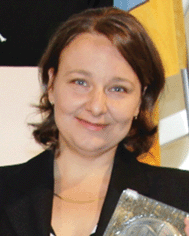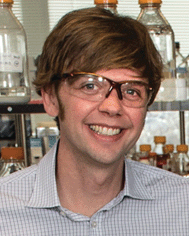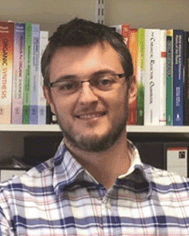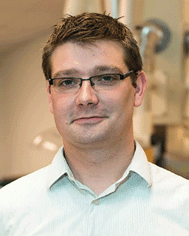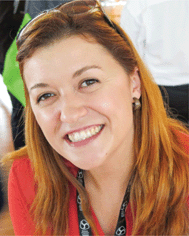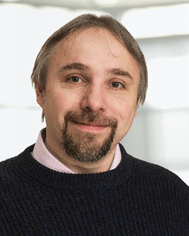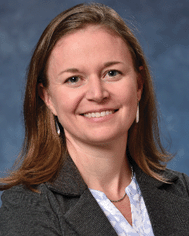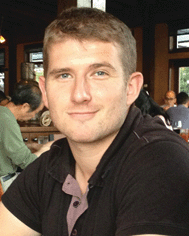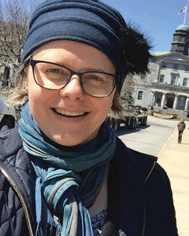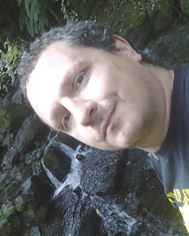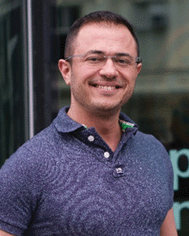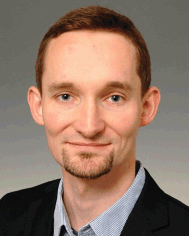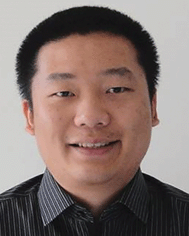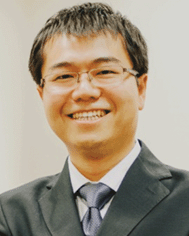DOI:
10.1039/C7GC90063E
(Editorial)
Green Chem., 2017,
19, 2707-2710
Green Chemistry Emerging Investigators 2017 themed issue
Green Chemistry is proud to welcome you to the inaugural Emerging Investigators themed issue. This issue highlights the excellent research being undertaken by the rising stars of the green chemistry field from across the globe.
All contributors were nominated by a member of the Green Chemistry Editorial or Advisory Board as an outstanding researcher in the early stages of their independent career, making a significant contribution to the advancement of green chemistry. Their profiles are shown below. We would like congratulate them on being featured, and wish them every success in their future research and careers.
We are delighted to present the resulting collection of articles which cover a breadth of topics and provide a valuable insight into the future of green chemistry; we hope you enjoy reading it.
Anna Simpson and Katie Lim
Katalin Barta studied chemistry at ELTE Budapest, Hungary and carried out master's research in alternative solvents in the group of István T. Horváth. Her PhD with Walter Leitner at RWTH-Aachen focused on asymmetric catalysis and ligand design. During post-doctoral research (2008–2010) with Prof. Peter Ford at UCSB she worked on the conversion of renewable resources with homogeneous and heterogeneous catalysts. Afterwards, she was an Associate Research Scientist (2010–2012) at the Yale University Center for Green Chemistry and Engineering (New Haven, USA) with Prof. P. T. Anastas where she worked on catalytic conversion of renewable resources, with special focus on lignin valorization. Since 2013, she has been a tenure track Assistant Professor at the Stratingh Institute for Chemistry, of the University of Groningen.
Gregg T. Beckham received his PhD in Chemical Engineering at MIT. He currently leads and works with an interdisciplinary team of biologists, chemists, and engineers at the National Renewable Energy Laboratory on conversion of biomass to fuels, chemicals, and materials including in metabolic engineering, fermentation, separations, catalysis, biopolymer and carbon fiber production, and lignin valorization.
Duncan L. Browne received his MChem with study in Industry degree from the University of Sheffield in 2006, and completed his PhD under the guidance of Prof. Joseph P. A. Harrity prior to conducting a 1 year EPSRC Doctoral Prize Fellowship position. In 2010 he moved to the laboratories of Prof. Steven V. Ley, FRS CBE at the University of Cambridge as a postdoctoral research associate and was then appointed Fellow of Natural Sciences at Sidney Sussex College. In 2014 he started his independent research career at Cardiff University where he is exploring the incorporation of sustainable chemical technologies into organic synthesis.
Justin M. Chalker earned a BS in Chemistry and a BA in the History and Philosophy of Science at The University of Pittsburgh in 2006. At Pittsburgh, he contributed to the total synthesis of several natural products under the direction of Theodore Cohen. Supported by a Rhodes Scholarship and a National Science Foundation Graduate Research Fellowship, Justin then completed his DPhil at the University of Oxford under the supervision of Benjamin Davis where he developed several tools for the site-selective modification of proteins. In 2012, Justin started his independent career as an assistant professor at The University of Tulsa where he established a diverse research program in organic chemistry, biochemistry and material science. In these projects, contributions to sustainability, environmental protection and human wellbeing are priority. In 2015, Justin moved to Flinders University in Adelaide, Australia where he is a Lecturer in Synthetic Chemistry and recipient of an Australian Research Council Discovery Early Career Researcher Award. In 2016, Justin was named Tall Poppy of the Year for South Australia in recognition of his achievements in research, teaching and science communication.
Mara G. Freire received her PhD degree in 2007 in Chemical Engineering from University of Aveiro, followed by post-doctoral research activities at ITQB2, New University of Lisbon, Portugal. Currently, she is a Coordinator Researcher at the Chemistry Department of University of Aveiro, the Coordinator of Group 5 within CICECO, Biomedic and Biomimetic Materials, and a member of the Young Scientists Seminar of the Lisbon Academy of Sciences. In addition to other projects and awards, in 2014 Freire was awarded with a European Research Council (ERC) Starting Grant. Her main research interests comprise the development of more sustainable and integrated separation, concentration and purification platforms for value-added compounds.
Tomislav Friščić is an Associate Professor at McGill University. He received his BSc in 2002 from the University of Zagreb (Croatia) with B. Kaitner, PhD in 2006 with L. R. MacGillivray at the University of Iowa (USA), and did post-doctoral studies with W. Jones at the Pfizer Institute for Pharmaceutical Materials Science, University of Cambridge (UK). His principal interests are in the understanding of solid-state reactivity and its applications for innovative, sustainable chemical synthesis. He received several awards, most recently the 2017 NSERC E. W. R. Steacie Memorial Fellowship and the 2016 McGill University Principal's Award for Outstanding Emerging Investigators.
Leanne M. Gilbertson is an Assistant Professor in the Department of Civil and Environmental Engineering at the University of Pittsburgh with a secondary appointment in the Department of Chemical and Petroleum Engineering. Her research group aims to inform sustainable design of emerging materials and products using empirical and life cycle assessment approaches. Dr Gilbertson completed her postdoctoral training in the Center for Green Chemistry and Green Engineering at Yale University, where she also received her Master's and PhD degrees in chemical and environmental engineering. Dr Gilbertson's bachelor's degree is in chemistry and education from Hamilton College.
Ceri Hammond is a Royal Society University Research Fellow (RS URF), and heads the Catalysis Engineering research group at the Cardiff Catalysis Institute (CCI). Ceri obtained his PhD under the guidance of Prof. Graham J. Hutchings FRS at the CCI, for which he was awarded the biennial “Best European PhD Thesis Award” of EFCATS. Following periods at ETH Zürich (post-doctoral research fellow with Prof. Ive Hermans, 2011–2014) and Stanford University (RSC Mobility Fellow with Prof. Edward I. Solomon, 2014–2015), he returned to the CCI as RS URF. His fellowship is partially supported by Stanford University, where he continues to spend several months each year. His research groups sits on the chemistry/chemical engineering interface, and specializes in the development of heterogeneous catalytic processes through a combination of kinetic studies (transient, steady state), materials design,
in situ spectroscopy and reaction engineering. To date, he has co-authored >45 publications, holds 2 patents, and has provided >15 invited lectures.
Audrey Moores is an Associate Professor and Canada Research Chair in Green Chemistry at McGill Chemistry, where she started her independent career in 2007. She was for 4 years the co-associate director of the Center for Green Chemistry and Catalysis, a Quebec-wide research cluster and acts as scientific director on the board of GreenCenter Canada, an Ontario-based tech transfer company. She has also served as an associate editor for the journal
ACS Sustainable Chemistry & Engineering since 2016. She received a Science Communication Fellowship for Green Chemistry in 2011 and CNC-IUPAC travel award in 2016. She is a leading expert in the field of catalysis using metal, metal oxide and biomass-based nanomaterials, with a special emphasis on sustainable processes and the use of earth abundant starting materials.
Martin Prechtl, FRSC, Humboldtian/AvH and Heisenbergian/DFG, received the NRW-Returnee-Award 2009 (1.25m€) and works at the University of Cologne as Privatdozent. He acts as editor for Wiley, the Royal Society of Chemistry, DeGruyter and Elsevier. He edited the book “Nanocatalysis in Ionic Liquids”. Among other prizes, he holds the Ernst-Haage-Prize 2014 (MPI CEC) for his work on H
2-generation (
Nat. Commun., 2014 and a PCT patent). His group develops catalysts for application in (de)hydrogenation reactions. Before Cologne he performed research in Wuppertal, Bridgetown, São Paulo, Aachen, Mülheim/Ruhr, Porto Alegre and Berlin. He enjoys outdoor activities, sports, cooking, languages and derivatives like Mirandese, Papiamento, Talian or Bajan.
Roberto Rinaldi, FRSC, studied Chemistry at the State University of Campinas, Sao Paulo, Brazil and received his PhD in 2006. A year later, he joined the Max-Planck-Institut für Kohlenforschung as a postdoctoral research fellow where he became a Junior Group Leader in 2009. In 2010 he received the prestigious Sofja-Kovalevskaja Award from the Alexander von Humboldt Foundation, allowing him to launch his independent research group and develop outstanding research on lignin valorisation. For his contribution to advanced concepts for dissolution and deconstruction of lignocellulosic biomass, he was awarded the Willi Keim Prize 2014 given by the Advanced Fluids Subject Division of ProcessNet (an initiative of DECHEMA and VDI-GVC). He was appointed Senior Lecturer in the Department of Chemical Engineering at Imperial College London in 2015 and he has since established a research group. In the Tomorrow's Chemical Technologies Lab, his group develops research into early-stage catalytic conversion of lignin, catalytic hydrogen-transfer, mechanocatalysis and valorisation of cellulose. His research is supported by the highly competitive European Research Council (ERC) Consolidator Grant (LIGNINFIRST, project no. 725762) initiated in 2017.
Marcus Rose graduated in chemistry from Dresden University of Technology in 2007, where he also obtained his PhD with Prof. Stefan Kaskel in 2010. Thereafter, he joined the group of Prof. Regina Palkovits at the Max-Planck-Institut für Kohlenforschung as a postdoctoral fellow. In 2011, he moved with the group to RWTH Aachen University where he became group leader in 2012. In 2014 he was temporarily appointed as guest professor at Technische Universität Darmstadt. His research focuses on the catalytic conversion of biogenic platform chemicals and the development of porous organic framework materials for catalytic and separation applications.
Ning Yan is an assistant professor at the Van't Hoff Institute for Molecular Sciences (HIMS), University of Amsterdam, The Netherlands. He received a BEng degree in Materials Science and Engineering from Huazhong University of Science and Technology, China in 2009, and a PhD degree from University of Alberta, Canada in 2013. His current research is centered on fuel cells, CO
2 valorization and energy storage research.
Ning Yan was born in Sichuan, China. He received his BS and PhD degrees in Chemistry from Peking University. After a stay at EPFL in Switzerland as a Marie Curie Fellow, he joined the Department of Chemical and Biomolecular Engineering at the National University of Singapore as an Assistant Professor. The research topics of his group mainly concern biomass valorization, such as shell biorefinery, as well as advanced catalysis.
|
| This journal is © The Royal Society of Chemistry 2017 |

